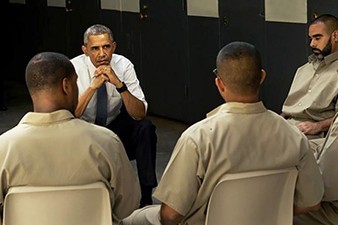
17/07/2015 10:40
Obama in Prison: Why He’s Lucky He Went as President, Not as a Pot Convict
He smoked weed and dabbled with cocaine in his youth. Given the disproportionate number of young black men who are arrested and sentenced for drugs, during his visit to El Reno Federal Correction Institution in El Reno, Oklahoma, on Thursday, President Barack Obama couldn’t help reflecting on what his future might have been.
“There but for the grace of God,” Obama told reporters after his visit, according to The New York Times. “And that is something we all have to think about.”
With more than 2.2 million Americans locked up in county, state, and federal prisons, the United States is home to the largest number of incarcerated individuals of any country in the world. We’re 5 percent of the world’s population, but we’re home to 25 percent of the planet’s inmates.
The horrific conditions men and women often experience in jails across the United States—overcrowding, brutal beatings, and rape—don’t tend to get much attention from politicians. Incarcerated individuals are barred from voting in every state except Maine and Vermont, and after they’re released, most states have some sort of restriction on people with felonies being able to cast a ballot.
The trip to El Reno makes Obama the first sitting president in U.S. history to visit a federal correctional institution. The minimum security prison for men, located about 35 miles west of Oklahoma City, is home to many inmates who are not too different from those Obama pardoned earlier this week: nonviolent drug offenders. The president toured the facility, saw the 9-by-10-foot cells that two or three men live in, and spoke with several inmates who are locked up for drug crimes.
So, Why Should You Care? Half of the more than 200,000 people serving time in federal prison are locked up because of nonviolent drug offenses. And you don’t have to be an El Chapo–style kingpin to end up doing time in a federal prison. According to the ACLU, 88 percent of marijuana arrests are for possession—not people trying to sell drugs but trying to use them.
There’s also a significant racial disparity in who gets arrested for drugs. In her 2010 New York Times best-seller The New Jim Crow, civil rights lawyer Michelle Alexander detailed how more black Americans are in prison or jail, or on probation or parole, than were enslaved in 1850. The ACLU found that a person who is black is 3.67 times more likely to be arrested for pot possession than someone who is white. “About one in every 35 African American men, one in every 88 Latino men, is serving time right now,” the president said during a speech at the NAACP’s national conference in Philadelphia this week. “Among white men, that number is one in 214.”
During his visit to El Reno, Obama made it clear that he wasn’t advocating for shorter sentences for rapists and murderers. But teenagers who might have been busted with a bag of weed during a traffic stop are branded for life with the “felon” label. They’re no longer eligible for student loans, and they have to check the “felon” box on job applications, which helps contribute to the United States’ sky-high recidivism rate.
"When they describe their youth and their childhood, these are young people who made mistakes that aren’t that different from the mistakes I made and the mistakes that a lot of you guys made,” Obama said after the visit, according to the Times. “The difference is, they did not have the kind of support structures, the second chances, the resources that would allow them to survive those mistakes.”








